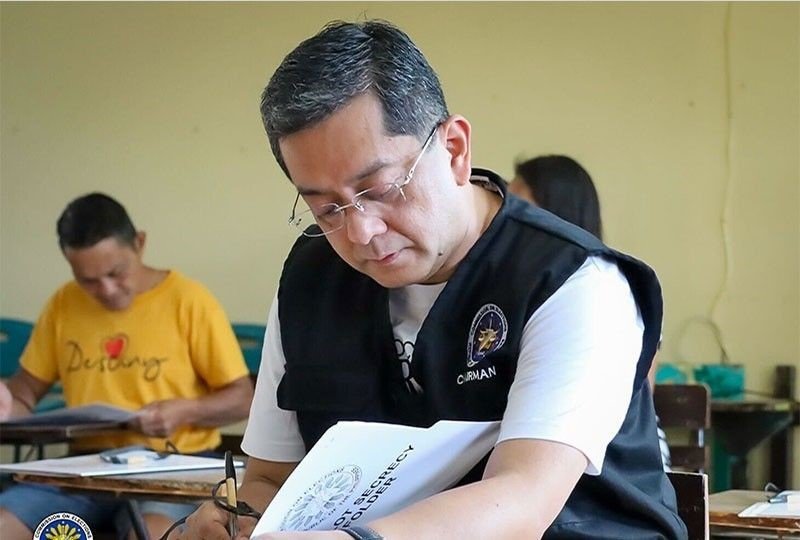Comelec wants one-week transition for winning bets
MANILA, Philippines — Winning candidates in Monday’s barangay and Sangguniang Kabataan elections (BSKE) may not be able to immediately assume their posts after the Commission on Elections (Comelec) requested the Department of the Interior Local Government (DILG) to allow at least a week’s transition.
Comelec Chairman George Garcia said he requested the DILG for a transition period for the newly elected barangay and SK officials from the incumbents.
“Although the DILG will forgo the requirement for winning bets to submit SOCE before assumption to office, there must be a proper turnover to avoid problems,” Garcia explained, referring to the Statement of Contribution and Expenditures.
But Garcia stressed that all candidates, including those who lost in the elections, are still required to submit the SOCE by Nov. 29.
He said winning candidates must secure certification from the Comelec that they submitted the SOCE, and even those who withdrew from the elections are still mandated to submit the document.
Comelec spokesman John Rex Laudiangco said winning candidates with pending disqualification cases will not be proclaimed. He said the Comelec has so far filed disqualification cases against 220 BSKE candidates for premature and illegal campaigning.
Comelec also filed disqualification complaints against 27 other candidates for vote buying. Yesterday, the Comelec filed disqualification cases against 60 more BSKE candidates for premature and illegal campaigning.
Minor hitches
Only minor hitches were observed during the BSKE, according to election watch group Legal Network for Truthful Elections (LENTE), which deployed a thousand volunteers as early as 4 a.m.
LENTE volunteers observed that some voters in Naga had to walk to polling precincts because roads were closed. There were also missing names in voters’ lists, and long queues in the early voting.
In general, LENTE said, mall voting was smoothly facilitated with little to no concerns. Across all 17 regions in the country, LENTE observed evident relaxation of health and safety protocols compared to the 2022 elections.
It also observed instances when security personnel from the Armed Forces of the Philippines and Philippine National Police were situated at the voting centers, disregarding the 50-meter rule.
For its part, the Manila Electric Co. said the voting period for the BSKE ended without any major power interruption. Meralco said minor incidents that were reported were isolated and immediately resolved with the help of its crews strategically positioned in service areas.
The Department of Energy, meanwhile, said a report from the National Electrification Administration from 5 a.m. to 11 a.m. yesterday indicated that 61 out of 99 electric cooperatives experienced power interruption.
The DOE said 162 interruptions were recorded with an average duration of 56.22 minutes. However, the agency said that as of noon, only seven electric cooperatives had ongoing power restoration, with six affected voting centers.
Hazard pay
All barangay tanods deserve a P1,000 monthly incentive hazard pay given the inherent dangers in ensuring peace and order in the community, Sen. Jinggoy Ejercito Estrada said yesterday.
Estrada, chairman of the Senate committee on labor, filed Senate Bill No. 794, a proposed measure that would grant P1,000 per month in hazard pay to all duly appointed members of the barangay brigades.
Estrada noted that while barangay tanods receive the same benefits as other barangay officials, they are given measly honoraria or allowances amounting to around P600 monthly.
The senator said funding for the hazard pay shall initially be sourced from the budget of the DILG, while its subsequent implementation will be included in the budgets of local government units.
In Congress, Senior Citizens party-list Rep. Rodolfo Ordanes is asking President Marcos to push for the creation of new barangays from the ones already “overpopulated.”
The Local Government Code provides that barangays in NCR and in highly urbanized cities should have at least 5,000 residents while other barangays should have at least 2,000 residents.
“I am hoping President Ferdinand Marcos Jr. will push for the creation of new barangays from the many overpopulated barangays – starting with the oversized barangays in Metro Manila, Metro Cebu, Metro Davao and many cities of Calabarzon,” he said.
Ordanes added there are also many barangays in the provinces that have “over three times the minimum population so it is better to just carve out new barangays from the ones with oversized population.”

